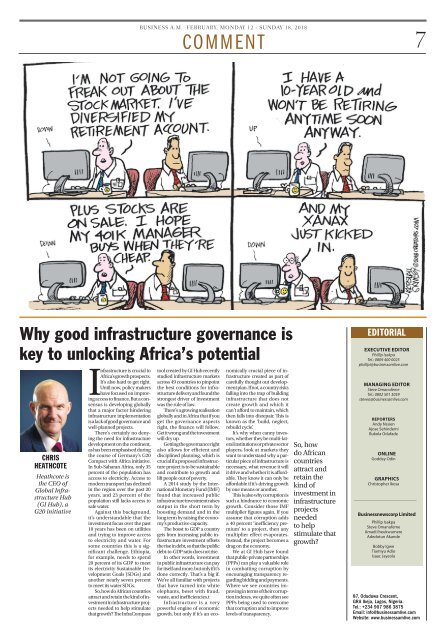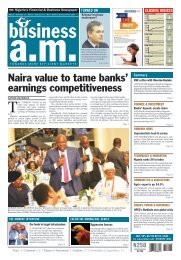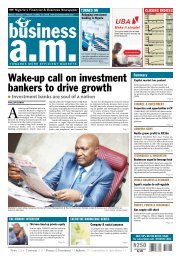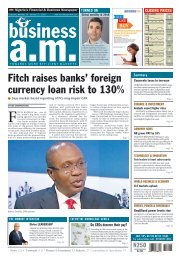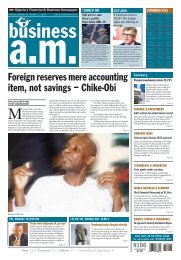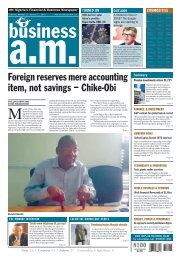12-02-2018
You also want an ePaper? Increase the reach of your titles
YUMPU automatically turns print PDFs into web optimized ePapers that Google loves.
BUSINESS A.M. FEBRUARY, MONDAY <strong>12</strong> - SUNDAY 18, <strong>2018</strong><br />
COMMENT<br />
7<br />
Why good infrastructure governance is<br />
key to unlocking Africa’s potential<br />
CHRIS<br />
HEATHCOTE<br />
Heathcote is<br />
the CEO of<br />
Global Infrastructure<br />
Hub<br />
(GI Hub), a<br />
G20 initiative<br />
Infrastructure is crucial to<br />
Africa’s growth prospects.<br />
It’s also hard to get right.<br />
Until now, policy makers<br />
have focused on improving<br />
access to finance. But a consensus<br />
is developing globally<br />
that a major factor hindering<br />
infrastructure implementation<br />
is a lack of good governance and<br />
well-planned projects.<br />
There’s certainly no denying<br />
the need for infrastructure<br />
development on the continent,<br />
as has been emphasised during<br />
the course of Germany’s G20<br />
Compact with Africa initiative.<br />
In Sub-Saharan Africa, only 35<br />
percent of the population has<br />
access to electricity. Access to<br />
modern transport has declined<br />
in the region over the past 20<br />
years, and 23 percent of the<br />
population still lacks access to<br />
safe water.<br />
Against this background,<br />
it’s understandable that the<br />
investment focus over the past<br />
10 years has been on utilities<br />
and trying to improve access<br />
to electricity and water. For<br />
some countries this is a significant<br />
challenge. Ethiopia,<br />
for example, needs to spend<br />
20 percent of its GDP to meet<br />
its electricity Sustainable Development<br />
Goals (SDGs) and<br />
another nearly seven percent<br />
to meet its water SDGs.<br />
So, how do African countries<br />
attract and retain the kind of investment<br />
in infrastructure projects<br />
needed to help stimulate<br />
that growth? The InfraCompass<br />
tool created by GI Hub recently<br />
studied infrastructure markets<br />
across 49 countries to pinpoint<br />
the best conditions for infrastructure<br />
delivery and found the<br />
strongest driver of investment<br />
was the rule of law.<br />
There’s a growing realisation<br />
globally and in Africa that if you<br />
get the governance aspects<br />
right, the finance will follow.<br />
Get it wrong and the investment<br />
will dry up.<br />
Getting the governance right<br />
also allows for efficient and<br />
disciplined planning, which is<br />
crucial if a proposed infrastructure<br />
project is to be sustainable<br />
and contribute to growth and<br />
lift people out of poverty.<br />
A 2014 study by the International<br />
Monetary Fund (IMF)<br />
found that increased public<br />
infrastructure investment raises<br />
output in the short term by<br />
boosting demand and in the<br />
long term by raising the economy’s<br />
productive capacity.<br />
The boost to GDP a country<br />
gets from increasing public infrastructure<br />
investment offsets<br />
the rise in debt, so that the public<br />
debt-to-GDP ratio does not rise.<br />
In other words, investment<br />
in public infrastructure can pay<br />
for itself and more, but only if it’s<br />
done correctly. That’s a big if.<br />
We’re all familiar with projects<br />
that have turned into white<br />
elephants, beset with fraud,<br />
waste, and inefficiencies.t<br />
Infrastructure is a very<br />
powerful engine of economic<br />
growth, but only if it’s an economically<br />
crucial piece of infrastructure<br />
created as part of<br />
carefully thought out development<br />
plan. If not, a country risks<br />
falling into the trap of building<br />
infrastructure that does not<br />
create growth and which it<br />
can’t afford to maintain, which<br />
then falls into disrepair. This is<br />
known as the ‘build, neglect,<br />
rebuild cycle’.<br />
It’s why when canny investors,<br />
whether they be multi-lateral<br />
institutions or private sector<br />
players, look at markets they<br />
want to understand why a particular<br />
piece of infrastructure is<br />
necessary, what revenue it will<br />
it drive and whether it is affordable.<br />
They know it can only be<br />
affordable if it’s driving growth<br />
by one means or another.<br />
This is also why corruption is<br />
such a hindrance to economic<br />
growth. Consider those IMF<br />
multiplier figures again. If you<br />
assume that corruption adds<br />
a 40 percent ‘inefficiency premium’<br />
to a project, then any<br />
multiplier effect evaporates.<br />
Instead, the project becomes a<br />
drag on the economy.<br />
We at GI Hub have found<br />
that public-private partnerships<br />
(PPPs) can play a valuable role<br />
in combatting corruption by<br />
encouraging transparency regarding<br />
bidding and payments.<br />
Where we see countries improving<br />
in terms of their corruption<br />
indexes, we quite often see<br />
PPPs being used to overcome<br />
that corruption and to improve<br />
levels of transparency.<br />
So, how<br />
do African<br />
countries<br />
attract and<br />
retain the<br />
kind of<br />
investment in<br />
infrastructure<br />
projects<br />
needed<br />
to help<br />
stimulate that<br />
growth?<br />
EDITORIAL<br />
EXECUTIVE EDITOR<br />
Phillip Isakpa<br />
Tel.: 0809 400 0<strong>02</strong>5<br />
phillipi@businessamlive.com<br />
MANAGING EDITOR<br />
Steve Omanufeme<br />
Tel.: 08<strong>02</strong> 501 3059<br />
steveo@businessamlive.com<br />
REPORTERS<br />
Andy Nssien<br />
Ajose Sehindemi<br />
Bukola Odufade<br />
ONLINE<br />
Goddey Odin<br />
GRAPHICS<br />
Christopher Ikosa<br />
_____________________________<br />
Businessnewscorp Limited<br />
Phillip Isakpa<br />
Steve Omanufeme<br />
Amadi Iheukwumere<br />
Adedotun Akande<br />
Bobby Igwe<br />
Tiamiyu Adio<br />
Isaac Jayeola<br />
87, Oduduwa Crescent,<br />
GRA Ikeja, Lagos, Nigeria.<br />
Tel.: +234 907 986 3875<br />
Email: info@businessamlive.com<br />
Website: www.businessamlive.com


